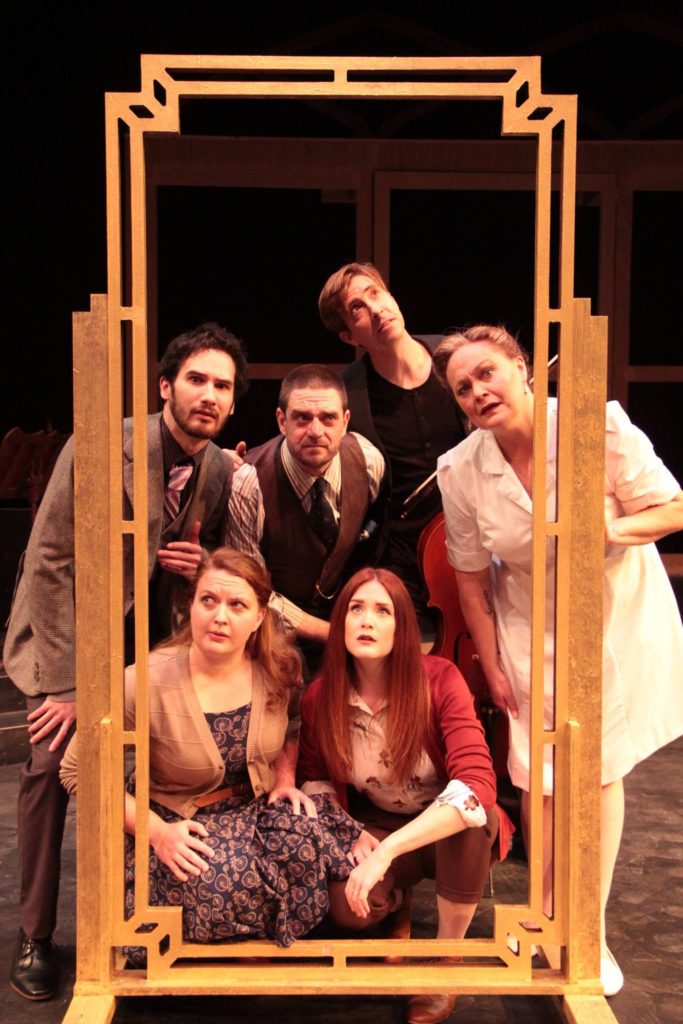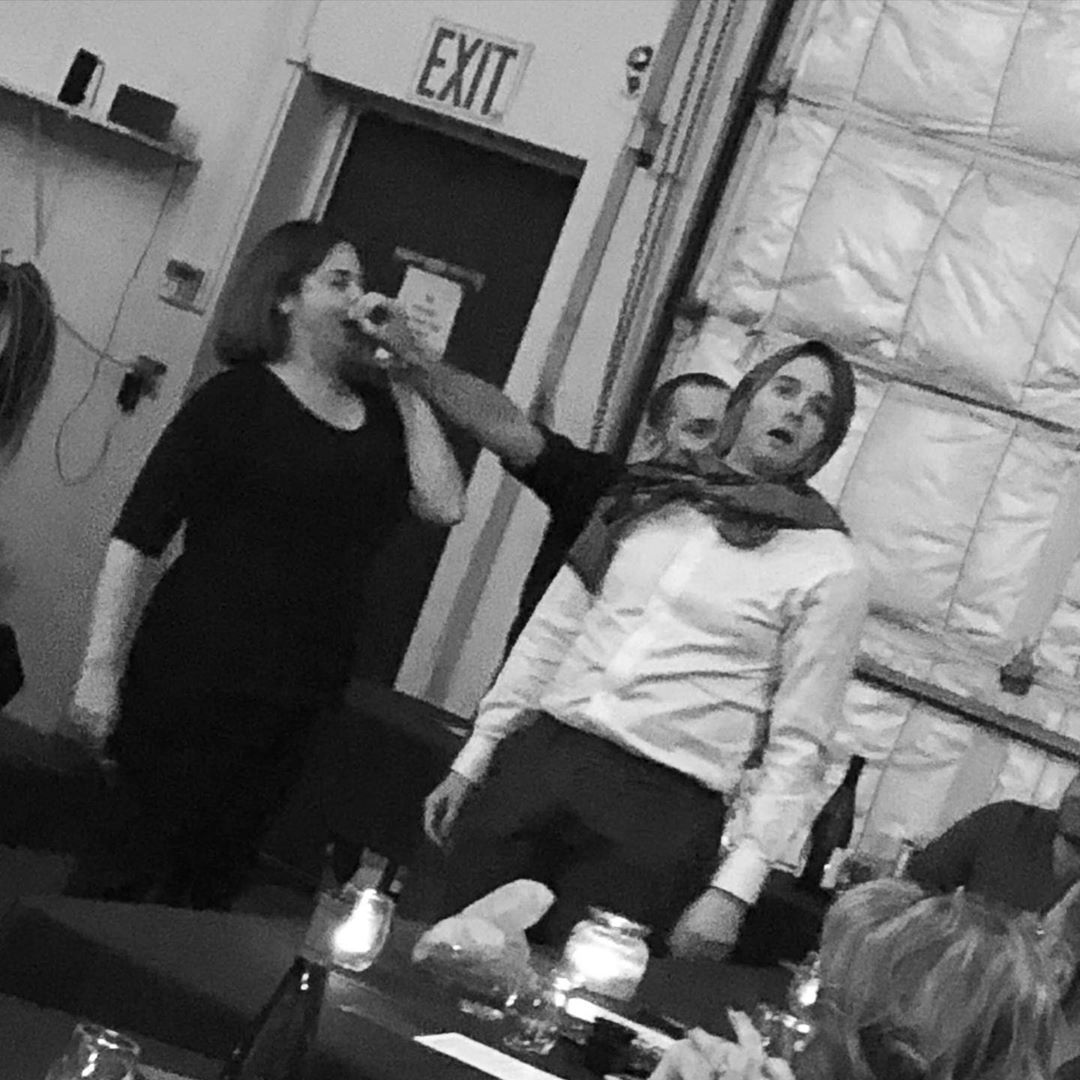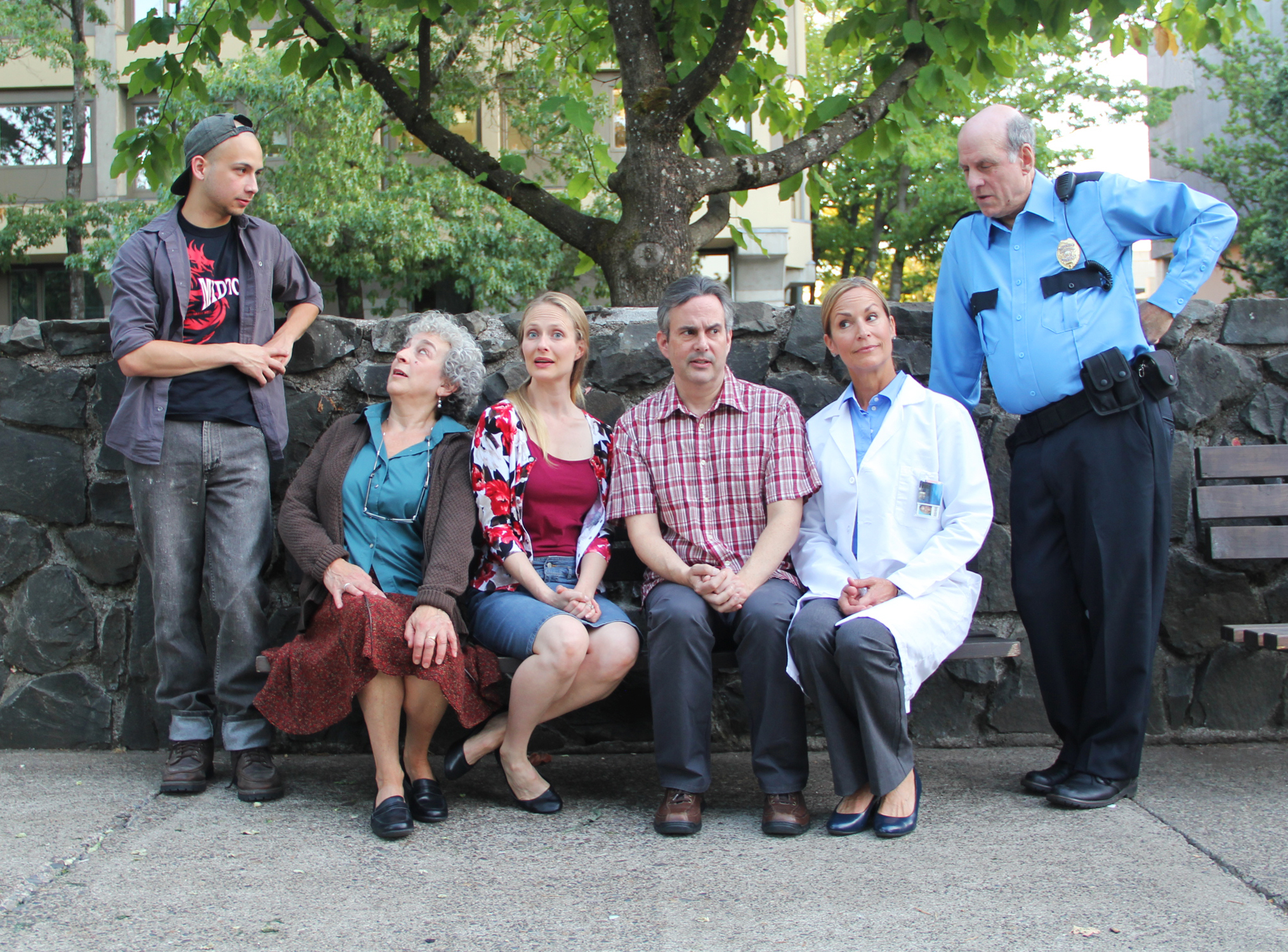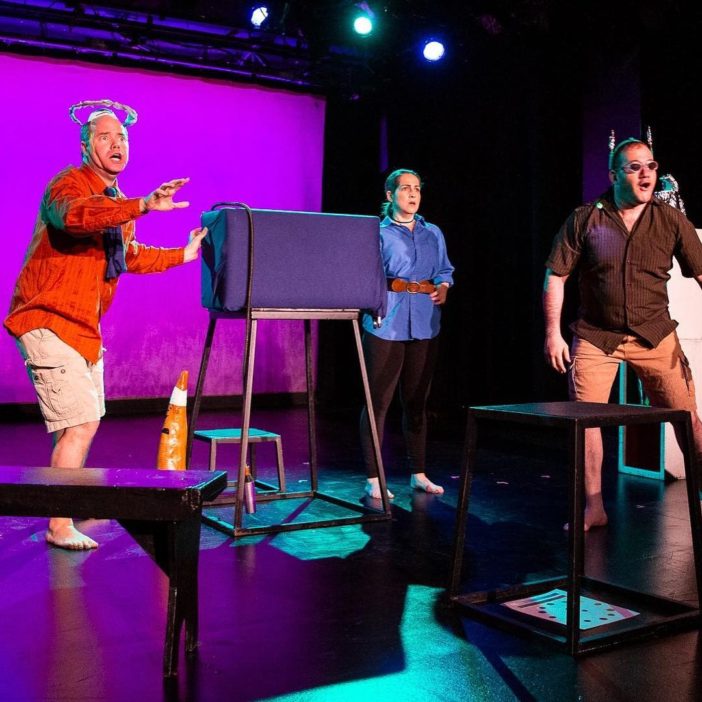Note for Readers:
We started this dialogue back in January. It’s been a bit of a season! — R.C.
Rachael Carnes: Hi, Tara! Thanks for chatting with me! I’m excited to connect. You’re a renaissance human — Acting, directing, singing, podcasting, arts-administering and so much more, all while bringing this amazing enthusiasm for mentoring early career arts professionals, and helping them to believe in themselves. So — Tell me about a typical day, or week, how does creativity find its way into your habits, and how is it a skill you use, in various aspects of your work and play?
Tara Wibrew: Hi Rach! Thanks for chatting with me! It’s so fun to catch you; I’m amazed by how much you do and absorb and create.
Thanks also for the sweet compliment. I do… a lot. Honestly, sometimes a typical week feels anything but creative because I spend a lot of time organizing my time. I refer to it as being a champion of Calendar Tetris (™). So boring, right?
But I’m so much a creature of habit. Coming up with creative habits keeps me making art, and habitualizing allows me space to be creative. Once I know the metaphorical box, I can think outside of it. Time is the ultimate box. Duke Ellington said something like, “I don’t need time, I need a deadline.” I live by that. With deadlines, I actually create far more than I do in a completely free and open space. I’m allowed to come up with and discard as many ideas as I want, but time forces me to say “yes” more and edit less.
You’re constantly writing, submitting scripts, reading, reviewing—to get all that done, what sorts of habits do you have in place? Do your habits alter your creativity or put pressure on it?

Carnes: Yes! I love that Ellington quote, I want it embroidered and framed and above my desk immediately. Like you, I approach a myriad of projects, and try to throw my whole heart into all of them, so measurable, time-sensitive and actionable to-do’s are key. I live by my Google Calendar, and use it like a bonkers KanBan board. I have standing daily, weekly and monthly tasks for myself, and I keep track of what I’ve done in the events themselves. It’s nuts, but works for me. I also use my gmail inbox as a to-do list, with more time-sensitive needs at the top. I love a zero’d out inbox, but I’m learning to live with leaving some things undone until I can do them thoughtfully. I’m always juggling work-work, freelance writing, playwriting, and of course personal and family stuff, so staying organized helps me feel like I can tread water.
All that is to say – the connections and connectivity – fuel creativity for me. Keeping up with conversations, circling back to collaborators, developing an idea with folx, revisiting someone I worked with, to see if they want to work on something new or bigger, taking on the capacity for new projects, all of that would fall apart, if I didn’t have some pretty dialed systems in place.
I love to say “Yes” — 2019 was the year of the “Yes” and I managed to travel and learn and meet new people and participate in more creative pursuits than ever before. “Yes” is an important first step, and then things seem to sort themselves out.
What are you saying “Yes” to, that you’re excited about right now?
Wibrew: So many things! Creatively, I find risk super sexy. I’m all-in as soon as someone on the team is daring to do something new, eager for opportunity, and excited by tackling problems.
A few projects I’m psyched about right now: directing Lucas Knath’s A Doll’s House, Part 2; supporting a timely staged reading of Network; adapting A Midsummer Night’s Dream to focus on the mechanicals, for staging in a winery; supporting a badass young artist (who you know well) putting together an evening of readings of works written by young womxn; and adapting a book series as an immersive theatre experience. I’m also really excited about writing new music with my band, several podcast dreams, musing on new projects… truth be told, “excited” is my natural state.

One of my working mantras is “How can I say yes?” I don’t care much for the yes/no binary. There’s always a way to make things happen, so long as you can assess what the core immovable dimensions are and what areas are more flexible. I know my own capacity and try to say “yes” to as much as possible, even if that means several elements of a project but not a process in its entirety. I also have zero interest in attempting things alone. Everything I mentioned being excited about? They’re all projects with amazing teams of people behind them. None of these are creations centered on an individual, even if an idea starts with one–every project grows toward building community.
How do you balance your “yes” energy? Do you pick things to say “no” to? Or do you need ways to turn off or tune out entirely? Does saying “yes” ever tire you out?
Carnes: I am loving this convo, because the heart of creativity is sustaining collaborating energy, which is a dynamic, kinetic experience. I don’t think marathon is the right metaphor, because each project has surprises and hurdles and discoveries. Maybe a marathon does, too? I hate jogging. Anyway, what I love about new projects is that they don’t move in a straight line. There are multitudes of mini goals and every time we get to one, I wanna throw confetti, and often do. My go-to word is “Yay!” — like I’m five, but no really. We have to celebrate! The process is so important, and I just think that the process should be fun. Hard work, focused, all that – but fun. I believe when we’re laughing, we’re learning. We’re still open. That’s a guiding principle for me.
And in terms of choosing what to take on, where to put my time and energy, I’ll try anything, I’m game for whatever. And if I find, in my debrief, that something took more out of me than it put in, I might reassess next time. It’s often surprising what tends to be the most deeply meaningful, in terms of experiences in the art form. The theme is relationships, though, more than ‘collaborators’ – the feeling of trust, humor, goofiness, the esprit de corps that can and does form, right here at home, or thousands of miles away. It’s kind of amazing. And I am with you on team work. It helps me to learn new things, and to not feel so much pressure. A great team makes the road smoother and the journey way lighter and more interesting. I gotta be able to crack jokes with people. For me, that’s bedrock.
I love this thing you said, that you have to assess “the core immovable dimensions are and what areas are more flexible” — YES. So true and so wise. That’s the thing, isn’t it? When I’m sizing up a project, I am willing to apply myself to it, if I know that there can be flexibility I can accommodate. None of us are in a cave working on just one thing. We’re all spinning 50,000 plates, so to add another one, I have to feel okay about my role in the equation.
I’ve definitely had the experience of piling too many yeses on top of each other, and though I was still fulfilling all the tasks and commitments to various collaborators, I felt like it was taking its toll. Now, I schedule myself out, booking new projects with a bit more of a nod to the space-time continuum. When I just get tired, I crave alone time, my dogs, walks, naps and TV. And good food. A couple of days in my pajamas watching crap TV and eating well and sleeping, and I’m usually back in business. What about you? How do you restore, after a big push?

Wibrew: Unstructured time is the best way for me to find rest. It’s a challenge to make myself not plan anything! Usually that manifests as cooking, listening to podcasts, playing with the dog, working on a puzzle–things that can happen any time, feel like “doing something,” and are minimally demanding. Puzzles especially. I love puzzles. (Winter is referred to as “puzzle season” at my house.)
I’ve instated JOMO days for myself each month. Are you familiar with that term? The Joy Of Missing Out rather than its Fear-based counterpart (FOMO). Restoration is an interesting concept, because even at rest, we’re still working, still creating—or I am, anyhow. Traditionally restful activities can be demanding. I recently turned down an opportunity to attend a production because I can’t watch theatre passively.
But I have to make time for experiences removed from my artistic life so I have something to make art about. Joy has to exist outside of productivity, so productivity does not become the measure of all things. I have to force myself to do nothing… it’s crazy. I’m such a lucky weirdo and am sure I sound like a complete ass. “I’m so busy doing what I love that I have to take a break from what I love.” Geez. Really, I cannot express how grateful and humbled I am to live this life.
You generate mass amounts of creative content, but you have such an active personal life. Do you have a happy space between your creative life and other lived experiences? How do you feed both of those areas, and how do they inform one another (if at all)?
Carnes: JOMO! Heck yeah – Thanks for introducing me to this magical term! Exactly. I recently had a meeting cancelled, and thought, this is the best feeling in the world, to get this hour back. What will I do with it? (Cut to a montage of me, running through fields of flowers, eating FroYo, dancing to an accordian player on the streets of Monmartre, etc.) I mean, time is a gift.
I didn’t know you like puzzles, and I find this fascinating, because I loathe them! No, really, I cannot stand them, and probably need to explore the origins of why, for at least five or six years.
RE balancing work and creative life and family and friends, I don’t know. Some days are easier than others, but I’m rooted in anchor points. Our busy family checks in at dinner, almost every night of the week. It’s often quick, but it’s phones-free (actually, our whole house is, a rule we implemented when our kids got phones, and it stuck, and it makes a huge difference… We don’t pull our phones out in the common spaces of our home.) This means that when I come through my front door, I can essentially step back in time, and for my kids, they’ve developed the habits not to focus on phones instead of people or places. For us, it helps with the puzzle of our lives.
In terms of my creative life, I get up freaking early, to write, send submissions, read plays, and do all the professional development tasks that require nurturing. And then I hug my kids and go to work! I am not an examplar of balance, probably. But I can really get shit done!
Last question: Advice for someone, who wants to do the kind of work that you do in theatre? Where to start, and how to sustain, that vision and activity level? And — This is a doozer — How does the way we’re making shifts in theatre practices now, help to define the future?

Wibrew: When deciding where to start anything, I return to my grandfather’s advice:
- Make a list.
- Write it down.
- Put numbers on it.
It’s good, practical advice that I rely on daily. As for sustaining vision and activity levels…
A good friend of mine grills me at the start of every project: Why this show, and why now? (Side note: always surround yourself with people who are smarter than you are.) Answering those questions clearly–with creative, personal, and/or professional reasons–forces me to be honest about my motivation and energy for the project. Similarly, my artistic pursuits are underscored by a need to use this medium in this moment toward a better, kinder, more empathetic world. That sense of greater purpose on any scale is necessary to maintain my energetic stride.
Theatre on the whole is redefining itself with similar questions, namely: Whose stories are we telling? Why these stories, why now? And our willingness to really examine those questions helps to keep theatre not only relevant but a vital component of culture. This isn’t to say that we shouldn’t produce “classics” or that every project needs to be a political piece (though it’s arguable that all art is political… but that’s a conversation for another day). We need pieces that simply spark joy, especially when times are dark! We need pieces that shout from the rooftops: beauty exists in everything, love is real, life is worthwhile, you are important! And we need to make sure the voices we amplify, regardless of genre, are more diverse and representative of humanity’s diverse realities. Theatre is working toward defining the future more collaboratively than ever before. How lucky we are to be alive right now.
I love that you don’t pull your punches when it comes to questions, Rach, and I appreciate your courageous curiosity so much! We have to tackle the big queries, over and over again, within ourselves and with one another. Thanks for everything, co-adventurer.


